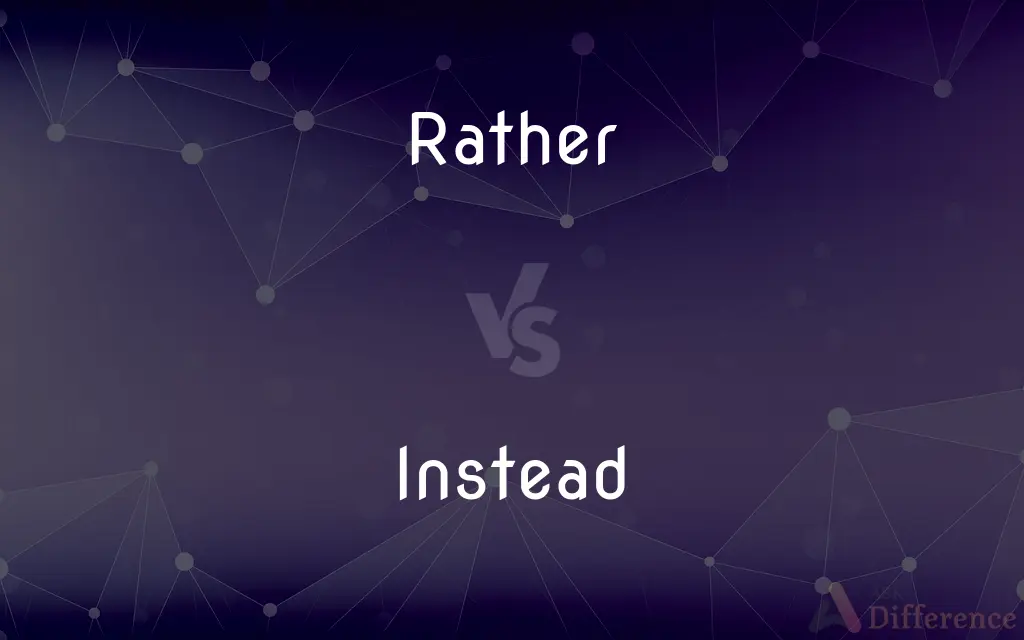Rather vs. Instead — What's the Difference?
By Maham Liaqat & Urooj Arif — Updated on April 21, 2024
"Rather" expresses preference or a degree of willingness, while "instead" denotes a substitution or replacement.

Difference Between Rather and Instead
Table of Contents
ADVERTISEMENT
Key Differences
"Rather" is commonly used to indicate a preference between options, suggesting a more favorable choice. "Instead," on the other hand, is used to suggest an alternative to an earlier mentioned option.
When someone says, "I would rather go hiking," it implies a choice of hiking over other activities. Whereas when someone uses "instead," as in "I'll have tea instead of coffee," it indicates a substitution of tea for coffee.
"Rather" can also be used to emphasize a particular aspect or quality, enhancing a sentence with a specific preference or inclination. In contrast, "instead" focuses purely on the aspect of replacement and does not imply preference.
In terms of structure, "rather" can be used both as an adverb and a conjunction, depending on the context, to show preference or likelihood. However, "instead" functions primarily as an adverb, focusing on the notion of replacing one thing with another.
Expressions using "rather" often carry a tone of mildness or politeness, suggesting a gentle preference. On the other hand, "instead" can sometimes convey a more definitive and clear choice, marking a direct substitution.
ADVERTISEMENT
Comparison Chart
Function
Can serve as adverb or conjunction
Primarily used as an adverb
Usage in Sentences
Indicates preference or likelihood
Indicates a substitution or replacement
Connotation
Often implies a softer, more polite preference
More definitive and direct
Example as Adverb
"She would rather not attend."
"He didn’t go; instead, he stayed home."
Example as Conjunction
"I would rather go home than stay out late."
Not applicable as it does not function as a conjunction
Compare with Definitions
Rather
As a preference indicator.
I would rather read than watch TV.
Instead
To indicate substitution.
Use this ingredient instead.
Rather
As a modifier to intensify.
That movie was rather interesting.
Instead
Showing alternative action.
We stayed home instead of going to the park.
Rather
To contrast with a less likely scenario.
She would rather die than betray her friends.
Instead
When opting out of a choice.
He didn’t apologize; instead, he left.
Rather
Indicating a slight degree of willingness.
I'd rather not discuss this now.
Instead
Highlighting a replacement option.
Take a bus instead of a train.
Rather
Used for polite suggestions.
You'd rather check this again.
Instead
To suggest a different course in response.
Instead, let’s try doing it this way.
Rather
Rather may refer to:
Instead
In the place of something previously mentioned; as a substitute or an equivalent
Having planned to drive, we walked instead.
Rather
More readily; preferably
I'd rather go to the movies.
Instead
In preference; as an alternative
Yearned instead for a home and family.
Rather
More exactly; more accurately
He's my friend, or rather he was my friend.
Instead
In the place of something (usually mentioned earlier); as a substitute or alternative.
I was going to go shopping, but I went dancing instead.
Rather
To a certain extent; somewhat
It's rather cold out. I was rather hoping you'd call.
Instead
In the place or room; - usually followed by of.
Let thistles grow of wheat.
Absalom made Amasa captain of the host instead of Joab.
Rather
On the contrary
This is not a thoughtful criticism. Rather it is an insult.
Instead
Equivalent; equal to; - usually with of.
This very consideration to a wise man is instead of a thousand arguments, to satisfy him, that in those times no such thing was believed.
Rather
(răthûr, rä-) Chiefly British Most certainly. Used as an emphatic affirmative reply.
Instead
In place of, or as an alternative to;
Felix became a herpetologist instead
Alternatively we could buy a used car
Rather
(obsolete) More quickly.
Instead
On the contrary;
Rather than disappoint the children, he did two quick tricks before he left
He didn't call; rather (or instead), he wrote her a letter
Used English terms instead of Latin ones
Rather
; preferably, in preference to. (Now usually followed by than)
I would rather stay in all day than go out with them.
I would like this one rather than the other one.
I would much rather be with you.
Rather
(conjunctive) Used to introduce a contradiction; on the contrary.
It wasn't supposed to be popular; rather, it was supposed to get the job done.
She didn't go along, but rather went home instead.
Rather
(conjunctive) Introducing a qualification or clarification; more precisely. (Now usually preceded by or.)
I didn't want to leave. Or rather I did, just not alone.
Rather
(degree) Somewhat, fairly.
This melon is rather tasteless, especially compared to the one we had last time.
We had some rather bad news today.
We’ll be seeing rather a lot of you over the next few days.
Rather
To prefer; to prefer to.
Rather
(obsolete) Prior; earlier; former.
Rather
An enthusiastic affirmation.
Would you like some? –Rather!
Rather
Prior; earlier; former.
Now no man dwelleth at the rather town.
Rather
Earlier; sooner; before.
Thou shalt, quod he, be rather false than I.
A good mean to come the rather to grace.
Rather
More readily or willingly; preferably.
My soul chooseth . . . death rather than my life.
Rather
On the other hand; to the contrary of what was said or suggested; instead.
Was nothing bettered, but rather grew worse.
Rather
Of two alternatives conceived of, this by preference to, or as more likely than, the other; somewhat.
He sought throughout the world, but sought in vain,And nowhere finding, rather feared her slain.
Rather
More properly; more correctly speaking.
This is an artWhich does mend nature, change it rather, butThe art itself is nature.
Rather
In some degree; somewhat; as, the day is rather warm; the house is rather damp.
You are come to me in happy time,The rather for I have some sport in hand.
Rather
On the contrary;
Rather than disappoint the children, he did two quick tricks before he left
He didn't call; rather (or instead), he wrote her a letter
Used English terms instead of Latin ones
Rather
To some (great or small) extent;
It was rather cold
The party was rather nice
The knife is rather dull
I rather regret that I cannot attend
He's rather good at playing the cello
He is kind of shy
Rather
More readily or willingly;
Clean it well, preferably with warm water
I'd rather be in Philadelphia
I'd sooner die than give up
Rather
To a degree (not used with a negative);
Quite tasty
Quite soon
Quite ill
Quite rich
Common Curiosities
How is "instead" commonly used?
It is used to denote substitution or replacement.
Can "rather" be used to intensify statements?
Yes, it can be used to intensify or emphasize a particular quality.
How does "rather" differ from "instead" in tone?
"Rather" often carries a tone of mildness or politeness, while "instead" is more definitive.
Is "instead" used to indicate preferences?
No, it primarily focuses on replacing one option with another.
Can "instead" be used as a conjunction?
No, "instead" is not used as a conjunction; it is an adverb.
Can "instead" indicate a choice between more than two options?
Typically, it is used to choose between one option and another, not multiple.
What are examples of "rather" used as a conjunction?
E.g., "I would rather stay home than go out."
What is the primary function of "rather" in a sentence?
It serves to express preference or a degree of willingness.
What is the effect of using "instead" in a sentence?
It clearly marks a direct substitution or alternative.
Is "rather" suitable for formal writing?
Yes, it is suitable for both formal and informal contexts.
When should one use "rather" over "instead"?
Use "rather" when indicating a preference or softening a statement.
In what context is "instead" most effective?
When clearly indicating that one thing is being replaced by another.
Share Your Discovery

Previous Comparison
Tank vs. Pond
Next Comparison
Shawarma vs. SouvlakiAuthor Spotlight
Written by
Maham LiaqatCo-written by
Urooj ArifUrooj is a skilled content writer at Ask Difference, known for her exceptional ability to simplify complex topics into engaging and informative content. With a passion for research and a flair for clear, concise writing, she consistently delivers articles that resonate with our diverse audience.














































